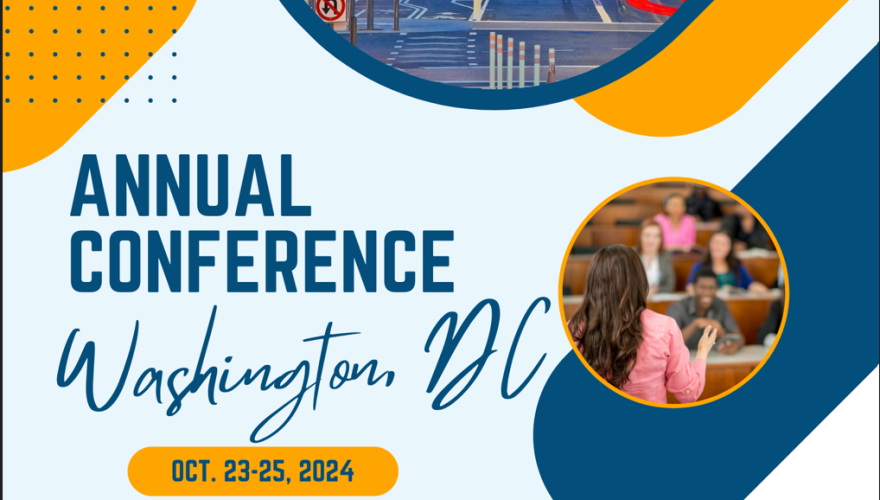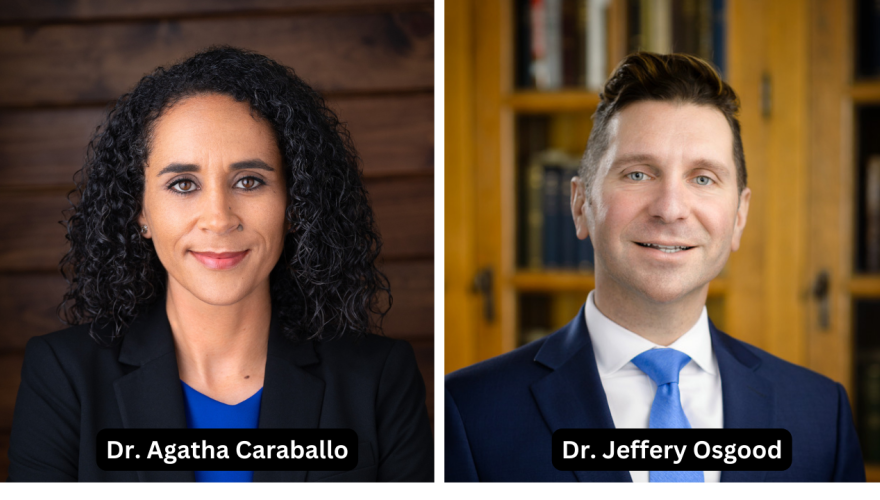2024 Annual Conference
October 23-25, 2024
Important Dates:
- Call for Panel Proposals open: February 6, 2024
- Sponsorships open: February 12, 2024
- Call for Proposals close: April 26, 2024
- Registration and Hotel Accomodations open: June 2024
- Conference schedule at a glance available: July 2024
2024 Conference Co-Chairs
2023-2024 NASPAA President Dr. RaJade M. Berry-James appointed Drs. Agatha Caraballo and Jeffery Osgood are the 2024 NASPAA Annual Conference Chairs. Dr. Agatha Caraballo is the Founding Director of the Maurice A. Ferré Institute for Civic Leadership and an Associate Teaching Professor in the Department of Public Policy and Administration in the Steven J. Green School of International & Public Affairs at Florida International University. Dr. Jeffery Osgood serves as the Interim Executive Vice President and Provost of West Chester University.
" I look forward to working with the NASPAA leadership, staff, and scholarly community to make 2024 a memorable conference that meets the demands and challenges of our time. We will continue to rise to the occasion and exceed expectations as a global network through collaboration and a shared vision for excellence in public service education." - Dr. Caraballo
"I am honored to have been asked by NASPAA President, Dr. RaJade M. Berry-James, to Co-Chair this year’s conference with Dr. Agatha Caraballo. I am excited to continue the success of past conferences and to work collaboratively with Dr. Berry-James and Dr. Caraballo in bringing the conference theme to life by providing tangible recommendations for advancing public service education."
-Dr. Osgood
Conference Theme and Tracks
Learn more about this year's conference theme and tracks below!
In this gathering, we will embrace the power of collaboration, dialogue, and shared leadership. 'Leading by Convening' emphasizes the strength that arises when diverse minds come together to address challenges, share insights, and forge innovative solutions. Through this collective leadership approach, we aim to foster a dynamic environment where every attendee plays a vital role in shaping the future. Join us in this transformative experience, where convening becomes the cornerstone of effective leadership and positive change.
In this gathering, we will embrace the power of collaboration, dialogue, and shared leadership. 'Leading by Convening' emphasizes the strength that arises when diverse minds come together to address challenges, share insights, and forge innovative solutions. Through this collective leadership approach, we aim to foster a dynamic environment where every attendee plays a vital role in shaping the future. Join us in this transformative experience, where convening becomes the cornerstone of effective leadership and positive change.
During President Berry James' speech at the 2023 NASPAA conference, she laid out a vision that helped to frame this best practice track. She asked NASPAA attendees to consider: "Building relationships to identify best practices, breakthrough approaches, and meaningful social change connects our public service curriculum to our commitment to our communities and the NASPAA code of good practice for institutional members." To that end, we seek proposals that discuss your successes and failures in public policy, affairs, and administration. Tell us how you've moved ideas from theory to practice. Tell us how your program has integrated AI into your curriculum. Have you successfully implemented the UN's 17 Sustainable Development Goals (SDGs) into your program curriculum? Cyber security is a trending topic; please share your experiences with our attendees. The best practice track seeks solutions-focused proposals that allow attendees to walk away from the session with immediately implementable practical solutions.
Democratic principles, governance, and human rights are under siege globally. In a thriving democracy, governance mechanisms are designed to respect and promote human rights, fostering a society where individuals can freely express themselves, participate in political processes, and live with dignity. Even with this design, democracies still fall short in ensuring the human rights of their people. Addressing human rights can be more difficult in non-democratic forms of government. In a world where we want to see societies that prioritize fairness, justice, and the well-being of all citizens–that dismantle discriminatory systems and actively engage with diverse stakeholders to ensure that the benefits of governance and policy decisions are distributed equitably–difficult discussions must be had.
- How are we using the power of collaboration, dialogue, and shared leadership to promote democratic principles, governance and human rights?
- How can human rights and strengthening of government accountability be fostered outside of democracies?
- How are we preparing students to hold difficult conversations?
- How are we preparing students to work within existing governance structures to improve the equity, fairness, rights, and dignity of the people they serve?
This track explores the intersection of technology, governance, and society. As digital disruption reshapes traditional paradigms, public sector leaders must navigate complexities, seize opportunities, and mitigate risks in the digital realm. This track convenes a crucial conversation to showcase the hallmarks of good governance and explore:
- Are we training public service professionals to leverage digital tools and data-driven insights to craft responsive policies that address contemporary challenges and anticipate future needs?
- How do we ensure students stay abreast of cutting-edge technologies such as artificial intelligence, blockchain, and the Internet of Things and explore their potential to revolutionize public service delivery, governance, and citizen engagement?
- How do we teach students to examine strategies for bridging the digital divide, promote digital literacy, and ensure equitable access to technology and digital services for all segments of society?
- How can we prepare students to navigate the ethical, legal, and regulatory considerations surrounding data governance, privacy, and cybersecurity in an era of pervasive digitization, surveillance, and interconnectedness?
Many of the factors that affect health are outside of the healthcare sector. As communities and populations evolve, public administrators must create and implement policies that will drive better and fairer health outcomes that are appropriately administered and implemented. Our world desperately needs solutions that get us closer to solving the climate and energy crises. How can we frame discussions of these issues in our programs? Have you found ways to effectively work with public sector administrators, scientists, and others to impact societies positively? How do we prepare our students to effectively develop, implement, and evaluate health, climate, and energy policies? Proposals submitted for this track should share best practices, proven management tactics, and diverse approaches that will help prepare our students to add their knowledge, skills, and abilities to help the world get closer to solving the challenges of this triple threat. Proposals that incorporate Sustainable Development Goals 3, 7, and 13 will be viewed favorably.
The challenges to public service education are universal considerations. This track focuses on the commonalities and differences in public affairs education and how we, as a global community, discuss and collaborate on addressing our shared obstacles and goals.
- How can we improve the teaching and learning materials used in our classrooms?
- Fostering innovation
- Expanding experiential learning opportunities
- Engaging with practitioners to bridge the gap between theory and practice
- How are we fostering conversations and collaborating globally with peers to improve teaching and learning?
- Collaborative teaching across universities
- Building a global network of engagement around teaching and learning
- Collaborative use of cases/simulations across universities
- What resources are available/ being developed to ensure teaching and learning materials are relevant to students in their home contexts?
This track investigates the quality, distribution, and actuation of administrative strategies and tools for career services professionals. Career professionals ensure that our efforts to evolve and expand public service education lead to desirable outcomes. By providing career professionals with optimal resources and techniques and guiding students to secure significant roles, we can support the development of the public and non-profit sectors.
- What are the current challenges faced by career professionals?
- What are career professionals asking for in terms of support and resources?
- What challenges are faced today, and how has it changed since 2019?
- How do these challenges differ from school to school based on size, location, and structure?
- What can we do to help?
- What strategies, resources, guidance, training, or tools can we develop and provide to career professionals?
- Can we address systemic issues by bringing additional stakeholders and diverse minds together to collaborate on a shared vision?
- Is there low-hanging fruit that we can take care of right now? Are there long-term systemic reforms that we can build towards?
- How do we measure success?
- What metrics will evaluate the success of career services in our universities?
- Are there successful examples of simple and affordable administrative practices that universities can replicate?


